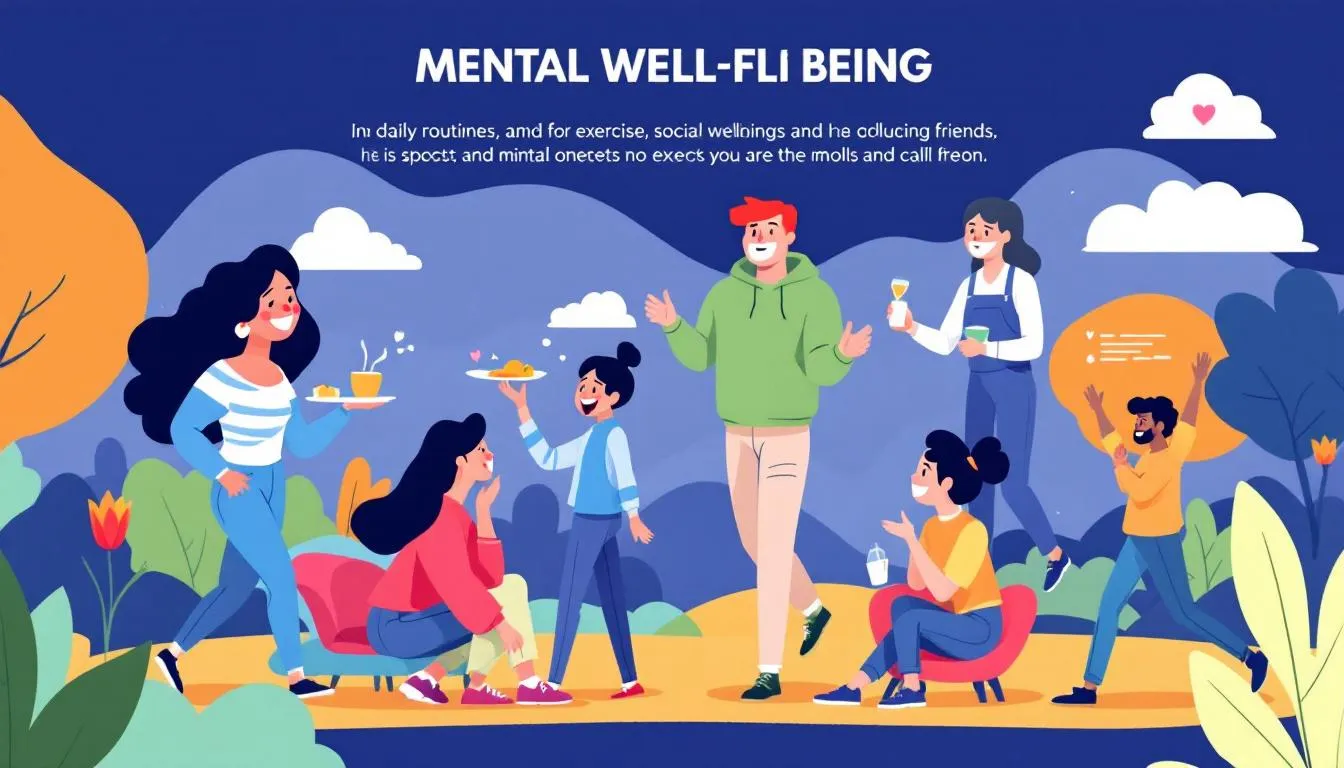10 Simple Healthy Habits (Especially for Over-50s)
Want to improve your health easily? Learn about practical habits for health that can transform your daily routine and boost your well-being.
Introduction to a Healthier Lifestyle
Healthy change doesn’t happen by wishful thinking—it comes from small, repeatable habits. Start with simple wins: a 15-minute daylight walk, a glass of water with each meal, and a set bedtime.
These build momentum and deliver real results: deeper sleep, steadier energy, and better mobility.
Pick two habits this week, track them daily, and adjust as you go. Small steps done consistently compound into lasting health.
According to research from the National Institute of Health, the integration of health-conscious choices into daily routines can dramatically reduce chronic disease susceptibility while enhancing overall energy capacity.
There is a very important consideration here though—by concentrating on these seemingly simple behavioral modifications, individuals will observe measurable improvements in energy levels, mood stability, and overall quality of life metrics.
The implications are clear: every deliberate step taken (regardless of its perceived magnitude) systematically advances one toward a healthier, more vibrant state of being.
Key Takeaways
- Establish a positive morning routine with stretches, a healthy breakfast, and consistent wake-up times to jumpstart your day.
- Stay hydrated by drinking water throughout the day to enhance cognitive function, mood, and energy levels.
- Engage in hobbies and maintain social connections to boost mental health, personal growth, and overall well-being.
- Explore new ideas for healthy habits, such as trying different routines or self-care practices, to keep your wellness journey fresh and motivating.
Setting Realistic Goals for Your Health Journey
Establishing 'realistic' and achievable objectives constitutes a fundamental cornerstone of any successful wellness intervention.
The initial step involves identifying your personal health targets - whether these encompass weight management, enhanced physical activity levels, or reducing digital screen exposure (a particularly relevant consideration in our modern sedentary lifestyle).
The strategic breakdown of these broader objectives into smaller, more manageable increments - such as committing to a structured 30-minute walking regimen three times weekly - serves to diminish the psychological burden and significantly enhance their attainability from a behavioural modification perspective.
The implementation of a robust support network (such as a trusted friend or family member) proves clinically valuable in maintaining motivation and adherence to established protocols.
Sharing your wellness objectives with these individuals and collectively acknowledging progress milestones creates a reinforcement mechanism that simply cannot be underestimated!
Every incremental achievement warrants recognition - whether it involves maintaining consistency with your new routine for a full week or implementing superior nutritional choices.
These progressive markers serve as essential reinforcement tools that consolidate emerging healthy behaviours and sustain forward momentum.
Maintaining focus on your individualised health targets while embracing the transformative process itself represents the optimal approach to long-term wellness success.
Morning Rituals for a Healthy Start

A positive morning routine can set the tone for your entire day. Quick stretches in the morning can warm up your muscles and prepare your body for upcoming activities.
These stretches can improve circulation, promote relaxation, and help you start your day on a positive note, enhancing your muscle tone. Pairing a new morning habit with an existing one, such as stretching right after brushing your teeth, can help make it stick.
A healthy breakfast is key to a successful morning, kickstarting your metabolism and providing the energy needed to tackle daily tasks.
Think of it as fuel for your body, giving you the strength and stamina to stay focused and productive.
You can also include quick physical activities like push ups in your morning routine to boost your energy and engage your muscles.
A healthy meal can set the tone for your day.
Avoiding the snooze button helps maintain a consistent morning routine. Waking up at the same time each day reinforces healthy habits that support better sleep patterns and overall health.
Embrace these morning rituals as part of your new routine, and you’ll find yourself more energized and ready to take on the day.
Staying Hydrated Throughout the Day
Hydration is fundamental to good health.
Drinking enough water supports digestion, enhances cognitive function, and boosts energy levels.
Even a slight decrease in body water can negatively impact your mood and concentration, so it’s essential to prioritize hydration in your daily routine.
Starting your day with a big glass of water can:
- Enhance focus and productivity, setting a positive tone for the rest of the day.
- Alleviate headaches.
- Prevent constipation by promoting regular bowel movements.
Drink more water consistently throughout the day, especially if you’re physically active or in a hot environment.
Proper hydration supports mental well-being and helps you stay motivated.
So, grab that water bottle and make hydration a priority - sip regularly - see our FAQs for simple hydration checks
Oral Health: The Importance of Flossing
Oral health is vital for overall well-being, and flossing plays a crucial role. It removes plaque and helps maintain the bone structure that supports your teeth.
By making flossing a part of your daily routine, you can prevent dental issues and promote better health.
For those who find traditional flossing challenging, alternatives like floss picks or water flossers can be just as effective in removing plaque.
Effective flossing involves wrapping the floss around your middle fingers, using a C shape to clean around each tooth, and sliding up and down from the gum line.
Daily flossing is a preventive measure that can reduce the risk of heart disease and other health issues linked to poor oral hygiene.
Make flossing a normal part of your routine, and you’ll be on your way to a healthier smile and a healthier you.
Protect Your Skin Daily
As your body’s largest organ, your skin needs daily protection. To help protect your skin:
- Apply sunscreen every day to prevent skin aging and sunburn.
- Use a broad-spectrum sunscreen that shields against harmful UVA and UVB rays.
- Choose a sunscreen with an SPF of at least 30 for adequate protection.
When applying sunscreen:
- Cover all exposed areas, including your face, neck, ears, and any bald or thinning spots.
- Use approximately one ounce to adequately cover your skin.
- Reapply sunscreen every two hours, especially after sweating or swimming, to ensure continuous protection.
Use our label guidance to choose nutrient dense options.
Mineral sunscreens can be a great option for those with sensitive skin, as they are less likely to cause irritation.
Making sunscreen application a daily habit reduces the risk of skin damage and promotes healthier skin for years to come.
Nutritious Snacking with Nuts and Seeds

Nuts and seeds are nutritional powerhouses rich in protein, healthy fats, fiber, vitamins, and minerals, making them an excellent choice for nutritious snacking. Incorporating these nutrient-dense food into your diet can help prevent cravings for processed foods and support a healthy weight.
To maximize the health benefits of nuts and seeds, consider the following:
- Pay attention to portion sizes.
- A palm-sized portion or approximately 30 grams of nuts on most days is recommended for optimal health.
- Roasting nuts can enhance their flavor without significantly altering their fat content, making for a tasty and satisfying snack.
Healthy nuts to include in your diet are:
- Almonds
- Walnuts
- Peanuts
- Cashews
Incorporating nuts and seeds into your eating habits allows you to enjoy their numerous health benefits and support a balanced diet.
You can eat them to enhance your nutrition.
Power of Napping for Mental Health
Napping isn’t just for kids; it’s a powerful tool for enhancing mental health.
Struggling with wake-ups? See Lifeguard Sleep
A short nap can improve relaxation, boost mood, and enhance cognitive function.
Taking a brief break to nap can lead to greater alertness and improved memory performance.
To maximize the benefits of napping without disrupting nighttime sleep, it is recommended to limit naps to a few times a week, such as no more than four times a week.
Key factors for a successful nap include:
- A quiet and comfortable environment
- Napping early in the afternoon to avoid disrupting nighttime sleep
- Keeping the nap duration less than 30 minutes for maximum benefit
This short rest period can leave you feeling refreshed and with more energy to tackle the rest of your day.
Embrace the power of napping as a healthy habit, and you’ll find that it supports better mental health and overall well-being.
Incorporating Physical Activity into Your Routine

Physical activity is crucial for maintaining good health.
You don’t need hours at the gym; integrating short bouts of physical activity throughout your day can be just as effective.
Walking or jogging in place during TV shows allows you to track your activity levels without missing your favorite episodes.
Choosing stairs over elevators is a simple way to incorporate more physical activity, contributing to cardiovascular health by elevating your heart rate.
Staying adequately hydrated is also crucial for enhancing physical performance, particularly during exercise or in hot conditions.
By making small changes like these, you can develop a new habit of healthy habits that support your physical health and overall well-being.
Remember, every small steps counts towards a healthier lifestyle with the aim to start small in improving your well-being. Here are some tips to help you along the way.
Breathing Techniques to Reduce Stress
Stress is a common part of daily life, but managing it effectively can lead to better health and balance.
One powerful technique for reducing stress is alternate-nostril breathing. This practice involves breathing through one nostril at a time, which can slow your breathing rhythm and promote deep breaths.
To practice alternate-nostril breathing, close one nostril and breathe through the other, then switch.
Another variation involves inhaling through one nostril, switching, and exhaling through the other.
Practicing this technique for 30 minutes daily can significantly decrease stress levels.
Incorporating breathing techniques into your daily routine helps manage stress more effectively, leading to a healthier, more balanced life.
Engaging in Hobbies for Personal Growth

Hobbies are not just leisure activities; they are pathways to personal growth and better mental health.
They can improve overall health and mood, foster creativity, and provide sensory engagement and cognitive stimulation. Participation in hobbies is associated with greater happiness and reduced symptoms of depression.
Dedicating 'me time' to hobbies is essential for recharging, improving mood, and gaining perspective.
Examples of enjoyable and fulfilling hobbies include:
- Gardening
- Building models
- Photography
- Making beer
- Making soap
- Making hot sauce
- Creating jewelry
Finding a new hobby can lead to personal satisfaction and enhance your quality of life as you create personal goals.
Dedicating time to hobbies supports mental well-being and fosters personal growth. Make hobbies a part of your wellness journey to spend time enjoying their benefits.
Social Connections for Better Mental Health

Maintaining social connections is crucial for better mental health and a healthier future.
Engaging with friends, family, and even casual acquaintances, including a family member, fosters feelings of belonging and being valued, a concept explored in social psychology.
Simple actions like making a phone call, sending an email, or chatting with a neighbor can help you stay socially connected.
Celebrating your progress by sharing wins with friends or family can boost your motivation and happiness.
Casual social interactions, such as chatting with grocery store employees or strangers, can also improve your mental health and help you achieve success. Curious about the evidence based on research?
Joining group activities or classes related to your hobbies can enhance exercise adherence and provide additional health benefits.
Engaging in social activities not only supports your mental health but also strengthens your personal growth and overall well-being.
Overcoming Obstacles to Healthy Habits
The establishment of sustainable health-promoting behaviors invariably presents clinical challenges for individuals, yet empirical evidence demonstrates that these 'obstacles' can be systematically addressed through evidence-based intervention strategies.
Initial assessment should focus on identifying potential barriers to compliance - whether they manifest as temporal constraints or motivational deficits - followed by the development of targeted therapeutic approaches.
For instance, when time limitations present as the primary impediment, research indicates that minor circadian adjustments (such as advancing wake times) or the integration of physical activity into existing daily protocols (incorporating ambulatory exercise during designated meal breaks or utilizing vertical transportation alternatives) can yield significant behavioral modifications.
The concept of 'enjoyable' habit formation represents a crucial element in long-term adherence to healthy lifestyle interventions.
Clinical observations suggest that social support mechanisms - such as engaging peer participants in ambulatory activities - or the exploration of novel movement-based recreational pursuits can substantially enhance compliance rates.
It is clinically important to recognize that behavioral 'setbacks' constitute a normative component of lifestyle modification processes - excessive self-criticism in response to suboptimal adherence patterns can indeed be counterproductive to therapeutic outcomes.
Maintaining a positive cognitive framework, sustaining focus on predetermined health objectives, and emphasizing incremental progress over absolute 'perfection' remain fundamental to successful intervention protocols.
Through consistent application of these evidence-based principles and sustained therapeutic persistence, health-promoting behaviors will ultimately integrate into an individual's routine behavioral repertoire as naturally occurring lifestyle patterns.
Tracking Progress and Celebrating Success
Tracking your 'progress' is indeed a remarkably powerful mechanism for maintaining motivation and witnessing the tangible benefits of your healthier lifestyle choices.
It's that straightforward. Consider the practice of maintaining a detailed journal (whether digital or traditional) or utilizing a mobile application to meticulously document your achievements - be it the completion of a full week of consistent exercise regimens or the preparation of nutritious, home-cooked meals.
These records serve a dual purpose: they help you maintain focus on the positive transformations you're actively implementing and provide a concrete reminder of the considerable distance you've traveled on your wellness journey.
There is a very important consideration here though. Don't overlook the significance of celebrating your successes - regardless of how seemingly modest they may appear.
Each progressive step forward (such as maintaining adherence to your newly established habits for a full week or achieving a personal milestone) deserves proper acknowledgment and recognition.
It's that simple, yet profoundly effective.
Celebrating these pivotal moments builds genuine confidence and reinforces your unwavering commitment to enhanced health outcomes.
Remember, the development of sustainable new habits requires considerable time and patience - so extend compassion to yourself and genuinely appreciate the journey toward becoming a healthier, more fulfilled version of yourself.
Staying Informed: Keeping Up with Health Trends
Staying informed about the latest health trends and research is quite simply essential for making smart choices about your overall wellbeing!
Rely on reputable sources - such as the National Institutes of Health - to get accurate and up-to-date information on topics like physical activity, nutrition, and wellness.
It's that straightforward.
Consulting with healthcare professionals or registered dietitians can also help you create a routine that's tailored to your unique needs and goals - even though navigating all the conflicting health advice out there can feel overwhelming at times.
There's a very important point here though.
By keeping yourself educated and aware, you can make informed decisions that support a healthier, more sustainable lifestyle.
Remember to prioritise credible sources and seek expert advice before making significant changes to your routine - the implications of following dodgy health fads or unverified 'miracle cures' simply can't be overstated!
Staying informed empowers you to create healthy habits that last, quite simply 'tipping the scales' in your favour and setting you up for a healthier future.
Summary
Incorporating these healthy habits into your daily routine can lead to a better, more fulfilling life.
From morning rituals and staying hydrated to engaging in hobbies and maintaining social connections, each small step contributes to your overall well-being.
Start small, stay motivated, and enjoy the journey towards a healthier you.
Frequently Asked Questions
Why is it important to have a morning routine?
Having a morning routine is crucial because it sets a positive tone for your day and boosts your energy for tackling tasks ahead. Embrace the power of a structured start to unlock your full potential!
How can I stay hydrated throughout the day?
To stay hydrated throughout the day, start with a big glass of water in the morning and make drinking water a consistent part of your routine. Remember, you’ve got this—keep that water bottle handy and sip regularly!
What are the benefits of flossing?
Flossing significantly enhances your oral health by removing plaque, preventing dental issues, and maintaining bone structure. Regular flossing not only keeps your smile bright but also supports your overall well-being!
How can I incorporate physical activity into my routine?
You can easily incorporate physical activity into your routine by taking the stairs instead of the elevator, doing short bursts of exercise during TV shows, and finding ways to stay active throughout the day. Every little effort counts, so start small and make it a fun part of your lifestyle!
Why are social connections important for mental health?
Social connections are crucial for mental health as they foster a sense of belonging and enhance both motivation and happiness. By nurturing these relationships, you can significantly improve your overall well-being!




